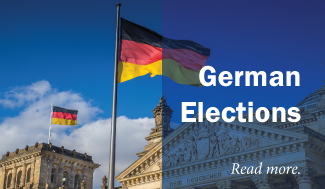Americans Only Have Eyes for Angela Merkel
 When Americans look across the Atlantic at the German election, it is impossible to imagine that anyone other than Merkel could lead Europe’s most powerful economy. Elected in 2005, she has outlasted, by far, her principal transatlantic counterparts — she is on her fourth British and French, and sixth Italian, prime ministers and her third U.S. president. Dubbed the Leader of the Free World by ever more publications, Merkel has become the indispensable European.
When Americans look across the Atlantic at the German election, it is impossible to imagine that anyone other than Merkel could lead Europe’s most powerful economy. Elected in 2005, she has outlasted, by far, her principal transatlantic counterparts — she is on her fourth British and French, and sixth Italian, prime ministers and her third U.S. president. Dubbed the Leader of the Free World by ever more publications, Merkel has become the indispensable European.
Merkel does look poised to glide to victory later this month and secure a fourth term in office. Even if she succeeds, we would be mistaken to assume that German politics is static. Merkel’s dominance of Germany’s highest office masks a shifting political landscape. Germany enjoys a parliamentary, not a presidential, system and thus, while the chancellor of Germany matters, so does the coalition she leads.
For the last four years, Merkel has presided over a Grand Coalition of Germany’s two major parties — her own Christian Democratic Union (CDU) and the center-left Social Democratic Party (SPD). Today, those two parties control 80 percent of the seats in Parliament. Even if the Grand Coalition were to continue — and other coalitions may well emerge — there is no public opinion survey that even hints such a coalition would control a majority of that magnitude. Why? Because the German political landscape is changing in significant ways. We Americans would do well to take note.
Germany looks set to have more parties in its Parliament than ever in the postwar era. To achieve representation in Parliament, a party must win at least 5 percent of the vote. As a result of the coming election, the CDU and SPD are likely to be joined by the liberal Free Democrats (FDP), the environmentalist Greens, the Left party (which grew out of the former communist party of East Germany merging with West Germany’s far left), and the far-right Alternative for Germany (AfD), not to mention the CSU, the CDU’s Bavarian sister party, which is always in coalition with the CDU at national level. The vote will thus be distributed across seven parties leading to more options for coalitions.
German voters may well opt for stability in their chancellor at a time when the world around them is in tumult, but they also are hungry for change.
Assuming the CDU is the big winner on September 24, Merkel will set out to build a new coalition. Basic math, along with political calculus, will dictate her choices. Some argue that the path of least resistance would be for Merkel to restart another Grand Coalition. But Merkel herself may not want to pursue that option, because she senses that the electorate is uneasy. German voters may well opt for stability in their chancellor at a time when the world around them is in tumult, but they also are hungry for change. After 12 years in office, Merkel may want to reinvigorate her government — and changing up her coalition partner may do just that.
Options will surely exist. If the liberal swing party, the Free Democrats, do well enough, perhaps she can forge a black (CDU)-yellow (FDP) coalition. Or if the numbers do not suffice, some are betting on the addition of the Greens for a so-called “Jamaica” coalition (because the party colors of black, yellow, and green mirror Jamaica’s flag). Thus, we should stay tuned in well past the 24th. A new and different coalition will mean four more years of Angela Merkel will not be old hat.
Finally, Americans should not overlook the stunning fact that for the first time in Germany’s postwar history, a far-right party, the AfD, will be represented in Germany’s national Parliament. Public opinion polls consistently indicate that the AfD will not only cross the 5 percent threshold, but could also end up as the third largest political force in the country. Because none of the established parties is willing to form a coalition with the AfD, far-right populists will not be part of the next German government; still, that hardly suggests that the AfD will not be a potent political force. The discontent with the establishment that is roiling politics across Europe and the United States — from Brexit to Trump — is palpable in Germany too, even if the remarkable Angela Merkel wins a fourth term.
